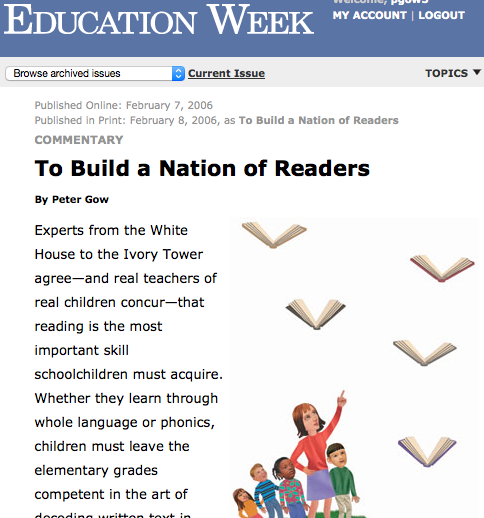I’m a lucky man. Upon occasion I do reflect in my old age on the heaps of cultural and social capital I carry around, or rather that carry me around, elevated perhaps above my true existential worth by flukes of race and gender and the socioeconomic accident of birth.
But I’m also lucky because I am literate, again (accidentally) born into a family who happen to put value on that capacity, and the social and cultural capital that come with it, and who have put lives’ worth of effort into extending this bounty to others. I’m lucky to be the parent of kids who value literacy, too, and seem inclined to do something about this.
A few years back I had a crazy idea, to turn the whole of what we now generally call fourth grade into an  extravaganza of reading, all day, every day, gently guided by teacher-coaches and literacy and reading specialists. The idea was to tidy up deficits and get kids into the habit of exploring their interests through the wonders of the written word. I wouldn’t be fussy—comic books, graphic novels, kid lit, are all okay with me, and what better way into STE(A)M-y subjects than through books and other publications on art, mathematics, engineering, and science; and I’m also okay with e-readers and texts like blogs or even short-form social media read on line. By the time the kids were ready for grade five, they’d all be readers, their difficulties identified and in remediation, their interests sparked.
extravaganza of reading, all day, every day, gently guided by teacher-coaches and literacy and reading specialists. The idea was to tidy up deficits and get kids into the habit of exploring their interests through the wonders of the written word. I wouldn’t be fussy—comic books, graphic novels, kid lit, are all okay with me, and what better way into STE(A)M-y subjects than through books and other publications on art, mathematics, engineering, and science; and I’m also okay with e-readers and texts like blogs or even short-form social media read on line. By the time the kids were ready for grade five, they’d all be readers, their difficulties identified and in remediation, their interests sparked.
I’m still waiting for a school to call me and say they’ve taken up the challenge I issued in Education Week on this topic, but I still have hopes, and so apparently does one of my own kids.
The kid in question messaged me from college the other night (he’s a senior) and sent me a link to an article of Laurene Powell Jobs’s new school-founding initiative along with some thoughts:
“Revive your 4th grade reading plan? High school is far too late to make an impactful change, unfortunately.
“If you care about fundamentals, start early. …How often does one read under supervision? Kids go home, but do we know they’re reading? A classroom centered around books could ensure that nobody passes through without being literate, which is of foundational importance to all other fields.”
And later: “Literacy is the magic bullet that cures everything.”
I haven’t given my fourth-grade idea much though lately, but I think about reading and writing all the time. I thought about it last weekend when I realized that each of the caregivers looking after my aging stepmother finishes her shift by writing out, in long-hand on the pages of a spiral notebook, a lengthy report on the previous hours—quite possibly, over the course of a week, doing more writing than I do, writing that has a life-or-death significance that their elementary school teachers never thought about and that wasn’t, probably, a big part of their nursing training. But there it is. Along with a pretty good-sized stack of those spiral notebooks.
So next time I’m feeling lucky I will add literacy to my list of good fortunes, and I urge readers(!) to do the same. And not just your and my own literacy, but the vast and plentiful literacies of the world around us, literacies that have brought us pleasure, safety, progress, and even the gadgets upon which I write and you read. Appreciate the capacity that gives caregivers a tool for sharing vital information and that gives me a chance to text with a kid away at college who cherishes literacy, too.
